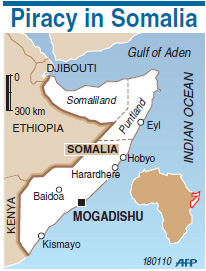Global General
Piracy appeals to young Somalis
(China Daily)
Updated: 2010-01-23 11:45
 |
Large Medium Small |
MOGADISHU: For local youth in the Somali coastal town of Harardhere, where the ransom for a Greek supertanker freed this week brought a huge windfall, the lure of piracy has never been so strong.
"Lots of militiamen are joining our piratehood every day and this is one of the reasons for the increased number of attacks," Abdi Yare from Harardhere said.

Later, his fellows released the Maran Centaurus, an oil tanker three times the size of a football field, in exchange for an estimated $7 million.
"I would say right now there are around a hundred of our pirates out at sea hunting ships on a given day," Abdi Yare said.
"This is a very high number considering the weather and, for sure, the number will increase once the wind dies," he added.
Somalia's pirates have at times squabbled but are, by and large, less fractious than other groups in the country's clan society and remain one of Somalia's best-organized paramilitary outfits.
Ransoms for valuable ships they seize can often fetch $3 million and more. Even the small share a rank-and-file pirate is left with after the bounty is divided constitutes a powerful magnet for Somali youth.
| ||||
In 2007, the pirates had it easy. Armed with Kalashnikov rifles and grapnel-type anchors, all they had to do was stray a few miles off the coast of Puntland to pick one of the 20,000 vessels that pass through the bottleneck of the Gulf of Aden each year.
The threat to one of the world's busiest and most crucial maritime routes spurred naval powers into scrambling warships to the region and the pirates now face a multi-billion-dollar armada of more than 15 nations.
But as navies perfected their act, so did the pirates, who ventured hundreds of miles into the Indian Ocean, where naval forces are stretched too thin to create an effective net.
"Nobody is really hunting us, our teams go and seize ships under the noses of the foreign forces," boasted Hasan Ganey, another Harardhere-based pirate. "When we see the navy, we simply change tack and they don't follow us."

One pirate freshman said business was brisk and explained he also enjoyed a spirit of camaraderie he did not find elsewhere.
"There is a great business out here. You go with friends, you seize a ship without firing a single shot and weeks later you come back with big money," said the 23-year-old, who gave his name only as Gure.
"We prefer to do this piracy thing until change comes to this country," he said by phone from Harardhere.
Somali pirates still hold at least 11 other vessels - with trophies ranging from a British chemical tanker to a ship carrying 2,300 Korean cars - and more than 270 seamen and other hostages.
Elders in Harardhere said that what was once a tiny and sleepy fishing village is becoming a modern-day Klondike - recalling the Alaska gold rush romanticized a century ago by writer Jack London. The community is bursting at the seams with a pirate class of nouveaux riches and new arrivals hoping to be like them.
"Most of them are new to ocean sailing, there are lots of them right who can't go out because of the waves but as soon as the weather eases, hundreds of them will flock out," Mohamoud Adan Tuke said.
"I predict 2010 will be the worst yet for people sailing the Indian Ocean."
AFP










